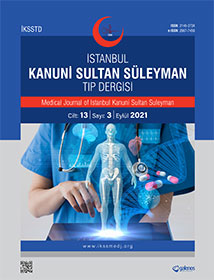






Evaluation of Children Referred to Pediatric Rheumatology Outpatient Clinic with Suspicious Laboratory Test Results
Şerife Gül Karadağ1, Hafize Emine Sönmez2, Ayşe Tanatar3, Nuray Aktay Ayaz31Department of Pediatric Rheumatology, University of Health Sciences, Kanuni Sultan Süleyman Research and Training Hospital, Istanbul, Turkey2Department of Pediatric Rheumatology, Kocaeli University, Faculty of Medicine, Kocaeli, Turkey
3Department of Pediatric Rheumatology, Istanbul University, Faculty of Medicine, Istanbul, Turkey
INTRODUCTION: We aimed to evaluate the patients who were referred to the pediatric rheumatology outpatient clinic with suspicious laboratory test results.
METHODS: All patients who were referred to our outpatient clinic with suspicious laboratory test results between March 2018 and March 2019 were evaluated.
RESULTS: A total of 273 new patients who were referred with suspicious laboratory test results were evaluated. Among them; 48% were girls and 52% were boys and they were referred mostly from the clinics of child health and diseases (70.3%). The most frequent indications for referrals were anti-streptolysin O (ASO) elevation (n=86) and anti-nuclear antibody (ANA) positivity (n=47), while 66% of the patients were not diagnosed with rheumatic disease. None of the patients without complaints but with suspicious laboratory test results (n=49) were diagnosed with rheumatic disease. While 64.6% of those diagnosed with rheumatic diseases had periodic fever syndrome, 17.1% had juvenile idiopathic arthritis, 8.5% had postinfectious arthritis, and the remaining 9.8% had connective tissue diseases, vasculitis and uveitis.
DISCUSSION AND CONCLUSION: Laboratory findings alone in childhood rheumatic diseases are not significant in patients without complaints. The diagnosis of rheumatic diseases should be made with the patient’s complaints, history, family history and physical examination findings and supported by laboratory findings. With the rational use of laboratory tests; unnecessary health expenses can be prevented and referrals of patients with nonrheumatic diseases to pediatric rheumatology outpatient clinics can be prevented.
Şüpheli Laboratuvar Test Sonuçları ile Çocuk Romatoloji Polikliniğine Yönlendirilen Hastaların Değerlendirilmesi
Şerife Gül Karadağ1, Hafize Emine Sönmez2, Ayşe Tanatar3, Nuray Aktay Ayaz31Sağlık Bilimleri Üniversitesi Kanuni Sultan Süleyman Eğitim ve Araştırma Hastanesi, Çocuk Romatoloji Kliniği, İstanbul2Kocaeli Üniversitesi İstanbul Tıp Fakültesi, Çocuk Sağlığı ve Hastalıkları Ana Bilim Dalı, Çocuk Romatoloji Bilim Dalı, İstanbul
3İstanbul Üniversitesi İstanbul Tıp Fakültesi, Çocuk Sağlığı ve Hastalıkları Ana Bilim Dalı, Çocuk Romatoloji Bilim Dalı, İstanbul
GİRİŞ ve AMAÇ: Çocuk romatoloji polikliniğine şüpheli laboratuvar sonuçları ile yönlendirilen hastaları değerlendirmeyi amaçladık.
YÖNTEM ve GEREÇLER: Polikliniğimize Mart 2018-Mart 2019 tarihleri arasında şüpheli laboratuvar sonuçları ile yönlendirilen tüm hastalar değerlendirildi.
BULGULAR: Şüpheli laboratuvar sonucu ile yönlendirilen toplam 273 yeni hasta incelendi. Bu hastaların %48’i kız, %52’si erkek olup, en çok çocuk sağlığı ve hastalıkları kliniklerinden (%70,3) yönlendirilmişlerdi. En çok yönlendirilme nedenleri anti-streptolizin O (ASO) yüksekliği (n=86) ve antinükleer antikor (ANA) pozitifliği (n=47) olurken, hastaların %66’sı romatolojik hastalık tanısı almadı. Yakınması olmayan ancak şüpheli laboratuvar sonucu olan 49 hastanın hiçbirine romatolojik hastalık tanısı konulmadı. Romatolojik hastalık tanısı alanların %64,6’sı periyodik ateş sendromu, %17,1’i juvenil idiyopatik artrit, %8,5’i postenfeksiyöz artrit iken geriye kalan %9,8’ini bağ dokusu hastalıkları, vaskülitler ve üveit oluşturmaktaydı.
TARTIŞMA ve SONUÇ: Çocukluk çağı romatizmal hastalıklarında yakınması olmayan hastalarda tek başına laboratuvar bulgusunun önemi yoktur. Romatolojik hastalıkların tanısı hastanın yakınmaları, öyküsü, aile öyküsü ve fizik muayene bulgularıyla konulup, laboratuvar bulgularıyla desteklenmelidir. Laboratuvar tetkiklerinin akılcı kullanımı ile; gereksiz sağlık harcamalarının önüne geçilebilir ve çocuk romatoloji polikliniklerine romatolojik hastalık dışı başvurular önlenebilir.
Corresponding Author: Şerife Gül Karadağ, Türkiye
Manuscript Language: Turkish








